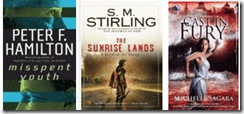Without Warning By John Birmingham eBook edition

This book examines a recent past in which the mainland USA was taken out of the world power equation. The plot devices and characters are well enough developed that by the end of this book you are ready for the sequel. Unfortunately, that next book is at least one year away from being published.
I like some of the story lines better than others. By and large though if you are a Science Fiction fan or a fan of the disaster novel this is a good read following an interesting premise.
Without the USA in play the world degrades quickly into disorder, as you might expect. Some outcomes seem likely and strategically correct. Others stretch credulity a bit but are plausible enough to carry your attention.
All in all Birmingham does a good job of drawing lines between the disappearance of the majority of US military power and the increase of chaos worldwide. This is a great spring break distraction or a really nice find if you haven’t read any of Birmingham’s other books. They are all worth reading if military fiction is one of the types of novels you enjoy. His knowledge base is solid and his writing skills are first class, so enjoy.
In Kuwait, American forces are stacked up, locked and loaded for the invasion of Iraq. In Paris, a covert agent, a woman who inhabits a twilight of lies and death, is close to cracking a terrorist cell. And just north of the equator, a forty-foot wood-hulled sailboat, manned by a drug runner, a pirate, and two gun-slinging beauties, is witness to the unspeakable. In one instant, all around the world, for politicians and peasants, from Gaza to Geneva, things will never be the same. A wave of inexplicable energy has slammed into the continental United States.
America, as we know it, is gone. . . . WITHOUT WARNINGNow U.S. soldiers are fighting a war without command or control. A correspondent records horrors for no one. Washington is gone and the line of succession is in tatters; the functioning remnants of government are in Pearl Harbor, Guantanamo Bay, and one desperate, isolated corner of the Northwest. For the jihads, it’s Allah’s miracle. For Saddam, it’s a chance to attack. Iran declares war on an America that doesn’t exist–except in the hearts and souls of the men and women who want it to.
In this astounding work of alternate fiction, John Birmingham hurtles us into a scenario that is unimaginable but shatteringly real: a world of financial ruin where a cloud of noxious waste–from America’s burning cities–darkens Europe, while men and women in offices around the globe struggle to make decisions that cannot hold and opportunists unleash their secret demons.
From a slick Texas lawyer who happens to be in the right place at the right time to a hard-working city engineer in Seattle who becomes his terrified city’s only hope, from the cancer-stricken secret agent to a drug runner off the Mexican coast and a U.S. general in Cuba, Without Warning tells a fast, furious story of survival, violence, and a new, soul-shattering reality. The first in an epic trilogy that will leave readers breathless and astounded, Without Warning offers a world without its policeman, its Great Satan, or its savior–as an unknowable future struggles to be born.





 as science fact.
as science fact. 




